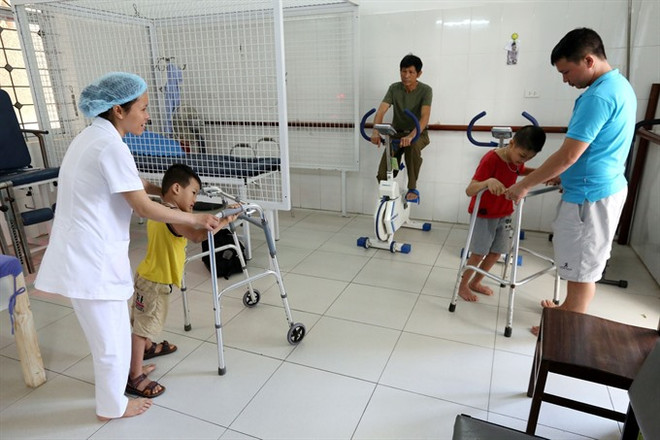 Handicapped children receive treatment at Hanoi Orthopedic and Rehabilitation Hospital (Source: VNA)
Handicapped children receive treatment at Hanoi Orthopedic and Rehabilitation Hospital (Source: VNA)Hanoi (VNS/VNA) - HandicappedVietnamese children face obstacles to access education, leaving the majority ofthem with a low level of education and few job opportunities, heard a recent conferencein Hanoi.
Disabled students also struggle to accesshealthcare, vocational training and consultations on job searching, legalassistance and recreational activities.
Improving the educational environment fordisabled children and adolescents, the conference’s theme, is a necessity tohelp them better integrate into society, educational officials and experts atthe event agreed.
Pham Xuan Tien, Director of the Hanoi Departmentof Education and Training, said many disabled students do not have certificatesof disability, which hinders them from assessing social protection andeducational assistance.
Because many families do not want to let othersknow their child is disabled, they refuse to register them as disabled, hesaid.
Another difficulty is that most schools thatteach both non-disabled and disabled students do not have learning equipmentfor the disabled, he said.
Duong Thi Van, Director of the Centre ofDisabled Integration Consultation and Assistance, said upgrading schoolfacilities plays a key role in helping disabled children integrate into thegeneral educational environment.
Between 2017 and 2019, the centre has beenworking with Angels’ Haven to implement a project aimed at improving theeducational environment for handicapped children and adolescents in Hanoi,sponsored by the Korea International CooperationAgency (KOICA).
Nearly 350 people including disabled students,their parents and teachers of Binh Minh and Thanh Tri primary schools benefitfrom the project.
The project has equipped these schools withprojectors, computers, air-conditioners and other teaching equipment. Schooltoilets have been upgraded and more ramps and handrails have been installed toassist handicapped students.
Van said disabled children lack skills to liveindependently, while teachers and parents lack knowledge and skills on how toteach them. The project has trained parents and teachers in these skills.
Sharing experience from the Republic of Korea (RoK),Professor Kim Eun Sook, head of the RoK’s National Special Education Institute,said the RoK has a special education law for the handicapped in which educationis compulsory for those aged 3 to 17. Education is free for disabled newbornsand babies under three years old.
The law also sets a standard for special classesfor disabled students in which each teacher is responsible for four students.
Van proposed the engagement and of civil societyorganisations, research institutes, schools, business sector and internationalnon-governmental organisations in assisting handicapped children andadolescents access education.
The collaboration would also effectively useresources mobilised for the work, she said.-VNS/VNA





























